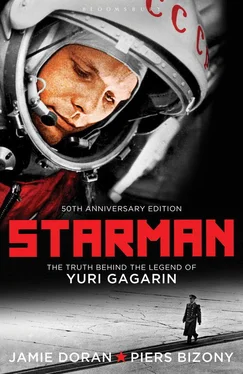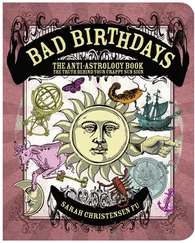Jamie Doran and Piers Bizony
STARMAN
THE TRUTH BEHIND THE LEGEND OF YURI GAGARIN
50th Anniversary Edition
Dedicated to the memory of
Olga Alexandrei and Igor Nosov
The Soviet period of history is, for some, a time best forgotten. The massacres of the Purges, the horrors of the Gulags and forced labour, the fictitious Five Year Plans and the Orwellian lack of personal freedom hardly make for happy memories. The other side of the coin, however, is that many of humankind’s greatest achievements came from a nation that had to be almost entirely rebuilt after the devastation of the Second World War. Twenty-seven million Russians died fighting the Nazis, and the entire infrastructure of their nation was disrupted – but after barely a decade, the Soviet Union was a global superpower, with new world-beating technology capable of reaching into space.
Yet, for all but a very few elderly die-hards, there are no great heroes from the Soviet era. Indeed, to be a hero at all under communism was itself an anomaly, for no individual could be greater than the collective whole. No, there were no great heroes… except for one.
At a giant crossroads on Moscow’s Leninsky Prospekt a 30-metre-high steel statue of him dominates the skyline, while ninety-six kilometres to the north-east another memorial marks the spot where, just a few days after his thirty-fourth birthday, he died in a terrible accident that gouged a huge crater in the frost-hardened earth. Three decades after this catastrophe, fresh bouquets of flowers at the site confirm the continuing love of ordinary citizens for this man. Young or old, privileged or poor, most Russians still smile with pride at the merest mention of his name. They recall with genuine affection a peasant boy with a winning smile, who stunned the entire world with his achievement. Russians don’t hesitate to remind us Westerners, ‘He was the first, you know.’
The first man in space: Yuri Alexeyevich Gagarin.
My fascination with Gagarin was sparked three years ago, when I was completing a major television documentary series on the Soviet nuclear-weapons programme. It became clear to me that the story of The Red Bomb would not be complete without a description of the rockets that were built to carry them out into space, even as they threatened us with destruction here on earth.
After completion of The Red Bomb , I seriously considered producing a major multi-part series on the Soviet space programme, but it was a daunting task. Where to start? How to focus this enormous subject into a cohesive analysis?
A close friend in Moscow, one of my contacts within the KGB, solved the problem for me. One day he saw a Russian television programme making the silly and utterly unsubstantiated claim that Gagarin was still alive, having escaped from a mental institution where he had been incarcerated for the last thirty years. Even the KGB would not have been capable of ‘disappearing’ Russia’s greatest hero. My contact urged me to make a serious documentary film that told the truth. At that moment it occurred to me that Gagarin’s name was world-famous, yet nobody knew the first thing about him, or about the remarkable people who launched him into space aboard a converted nuclear missile. My next project was assured, in my own mind at least; and, as it happened, the BBC and other major broadcasters around the world shared my enthusiasm to reveal the unknown Yuri Gagarin.
Researching The Red Bomb took me and my production team into some very murky areas. For some reason I imagined that finding out about Gagarin would be slightly easier than unveiling the secrets of the ultra-secure Soviet nuclear-weapons programme. I was wrong. This time it was not so much the paranoid remnants of a massive State security system that I came up against, but the natural reticence of the individual Russian mind. The habit of discretion, at every level of society, has become utterly ingrained, long after the secret policemen have lost their power to enforce it.
I discovered that – even after all these years – many people who worked alongside Gagarin at the height of the Soviet space effort in the 1960s were unwilling to discuss their experiences, or to share their memories of the man himself. They were still afraid, I think, that some anonymous squad of men in heavy overcoats might turn up at their apartments in the early hours of the morning to arrest them for speaking out of turn. Perhaps more importantly, Westerners are still too foreign to be trusted with personal intimacies about old friends – and people who spent their entire careers in the Soviet military-industrial complex do not easily surrender their most sensitive technical secrets to outsiders.
Patiently, and I hope with tact and diplomacy, I persevered. I found that several key people were willing to speak, so long as they could give their testimony directly to fellow Russians rather than Western journalists. In this regard, my good friends Igor Morozov, Valerie Gorodetskaya and Maria Semenov were invaluable. They knew what was required and surpassed my greatest expectations. Morozov is a veteran of difficult, in-depth reporting from the old Soviet days. Gorodetskaya and Semenov have an astonishing ability to relax their interviewees while getting right down to the truth of the matter in hand. Gradually a degree of trust was established, and there was a ‘snowball’ effect, as reluctant witnesses took heart from the openness and enthusiasm of those who had spoken before them. An incredible amount of information emerged, and in this area we extend our thanks to Sergei Kuzhenko and Boris Malakhov for their invaluable help.
Inevitably the interviews had to be shortened, if the emerging television documentary was to fit into its standard 52-minute slot. I felt uneasy about wasting any of the stories entrusted to us by so many people who had been persuaded that we were going to make good use of their testimony. I decided that a book was needed, in addition to the film. Writer Piers Bizony joined our research team to co-write the book with me. It was a gamble, taken at short notice. Would we get along? Could we two very different characters, very much in control of our own different styles of storytelling and ways of working, collaborate on the same narrative without conflict?
Yes, we could. From the first, we saw exactly the same story, and the strength of our working relationship added to the strength of the book. I know something of Russia and its people, while Piers knows about their early rockets and the mind-set of the engineers who built them and the young pilots who flew aboard them. Together we explored fascinating and hitherto unknown aspects of Gagarin’s life and work that surprised and moved both of us, and gave us an overwhelming sense that we were bringing to light a truly important story.
But no amount of teamwork could easily overcome the problems of searching for facts, documents and people in a country so vast and complex as Russia. The old bureaucracies no longer fly the hammer and sickle above their rooftops, yet they remain as impenetrable as ever. Money is now the dominant preoccupation. Certain things are possible for the right price. No one in particular is to blame for this; it is simply a basic fact of life in the ‘New Russia’. The other problem is accountability. Who is in charge of any particular organization? Whom should we approach for access to buildings, for permission to use photographs or rights for film clips?
There are substantial historical archives in Russia, yet few people know exactly what they contain, because there simply is not the money available to catalogue and store them properly. Certain enterprising academics will search through them, for a price, but merely locating a particular resource does not guarantee access to it.
Читать дальше












